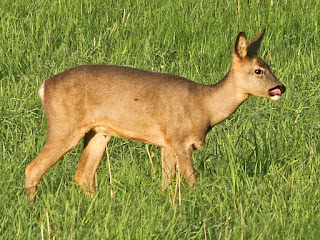Devil's Coach-horse Ocypus olens, North Elmham, 13th September
Among the caddisflies Limnephilus ignavus was my second ever and Halesus radiatus was new for the year. Others were Limnephilus flavicornis, 10 Limnephilus lunatus and Limnephilus sparsus.
Limnephilus ignavus (male), North Elmham, 13th September
Halesus radiatus (male), North Elmham, 13th September
Next day an early wander round the meadows produced this fine Roe Deer, one of the first I've seen actually on the meadows themselves (usually too much disturbance from dog-walkers).
Roe Deer, North Elmham Cathedral Meadows, 14th September
Butterflies included Small Copper and Comma.
Small Copper, North Elmham Cathedral Meadows, 14th September
Comma, North Elmham Cathedral Meadows, 14th September
There were 7-spot Ladybirds, a Hornet and this hoverfly which proved to be my first Epistrophe grossulariae.
Epistrophe grossulariae, North Elmham Cathedral Meadows, 14th September
I didn't get round to identifying this umbellifer until recently - turns out it was Burnet-Saxifrage. By no means an unusual plant but apparently the first time I've identified it.
Burnet-Saxifrage, North Elmham Cathedral Meadows, 14th September
That night at home moths included my first Pink-barred Sallow of the year.
Pink-barred Sallow, North Elmham, 14th September
This Ash-bud Moth Prays fraxinella wasn't new for the year but was a good deal rarer here - only my third record.
Ash-bud Moth Prays fraxinella, North Elmham, 14th September
Other moths were Wainscot Smudge Ypsolopha scabrella, Long-horned Flat-body Carcina quercana, Garden Rose Tortrix Acleris variegana, 2 Narrow-winged Greys Eudonia angustea, Chinese Character, Single-dotted Wave, 2 Common Marbled Carpets, Sharp-angled Carpet, 2 Brimstone Moths, 2 Dusky Thorns, 2 Light Emeralds, Buff Ermine, 3 Large Yellow Underwings, 5 Lesser Yellow Underwings, Broad-bordered Yellow Underwing, Square-spot Rustic, Common Wainscot, 3 Lunar Underwings, Sallow, 2 Flounced Rustics, Frosted Orange, Straw Dot and 7 Snouts.
There was one mayfly, one green lacewing: Pond Olive Cloeon dipterum and Chrysoperla carnea. The caddisflies were 4 Mottled Sedges Glyphotaelius pellucidus, 6 Limnephilus auricula, 14 Limnephilus lunatus and Limnephilus marmoratus. An Aphodius rufipes was the only beetle and a bug was probably Lygus pratensis but I seem to have lost the specimen to confirm it. This hoverfly was Melangyna cincta, new for the year.
Melangyna cincta, North Elmham, 14th September
Next day I found a Corn Moth Nemapogon granella on the outside of my window of the front door, my fifth here since 2016. Not bad for a moth that's only had six other records in Norfolk this millenium. I don't think we have any stored grain or vegetable products here that are likely to hold a population of these so can only presume they are originating from somewhere else. They do also breed on fungus, which was presumably the source of one that I netted up the road at the meadows earlier this year.
Corn Moth Nemapogon granella (female, gen det), North Elmham, 15th September

















No comments:
Post a Comment